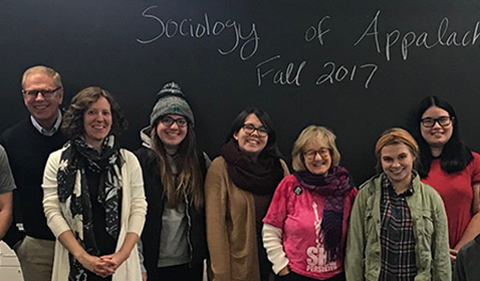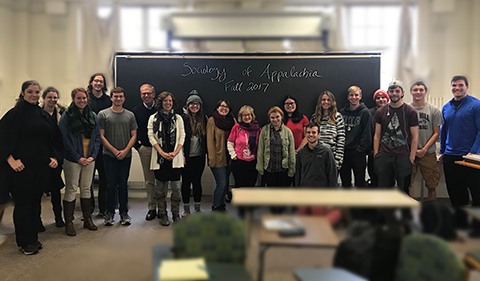
From left, former Ohio Gov. Ted Strickland, Dr. Rachel Terman, Kaitlyn McNeely, Samantha Miller, Amoriya, Hannah Veerkamp, Wendy Weyers
In addition to spending time with the Wealth & Poverty theme this semester, former Ohio Gov. Ted Strickland also spent some time in sociology classes.
In Dr. Nicole Kaufman’s Punishment and Society class, Strickland talked about the possible roots of the punitive culture in authoritarian child-rearing practices, problems with the corporal punishment of children, and his administration’s role in ending corporal punishment of children in Ohio schools.
Strickland also visited Dr. Larry Burmeister’s capstone seminar, “Politics in the Age of Trump,” in October. Among the topics he discussed were his personal journey to a career politics, how the current era of political polarization is fueled by basic disagreements about “facts,” and how big money in politics is eroding democratic principles of governance.
Burmeister says he heard several positive comments from students about the opportunity to hear Strickland’s reflections on his experience as an elected public official and on the current political environment.
In Dr. Amanda Cox’ Sociology Capstone class, Strickland focused on his experiences with the death penalty in Ohio during his term as governor, including his experience having to halt a botched execution. He also shared his perspective on the punitive nature of American society.
“My students were appreciative of his visit to our class,” Cox says, “and indicated that they enjoyed hearing his viewpoint on the death penalty and executions since he had a direct role in them when he was governor.”
And in November, Strickland visited Dr. Rachel Terman’s Sociology of Appalachia class to participate in a discussion of Hillbilly Elegy by J.D. Vance. Gov. Strickland asked the class to give one word to describe their reaction to the book, and responses ranged from “frustrated,” “underwhelming,” and “conflicted,” to “relatable,” “insightful,” and “eye-opening,” to “misrepresented,” “questionable,” and “incomplete.” The discussion covered important and useful ideas from the book as well as students’ critiques from a sociological perspective.

Rachel Terman’s Sociology of Appalachia class picture with Ted Strickland in November 2017.



















Comments